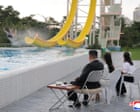
In a world that constantly evolves, noteworthy developments continue to unfold across a diverse spectrum of areas, offering both fascinating insights and opportunities for reflection. Among the recent highlights are North Korea’s significant stride in tourism, changes occurring within a historic Australian club, and promising courses leading to assured employment.
North Korea, a nation often more associated with political and military news, recently marked a significant expansion in its tourism sector. With the opening of the Wonsan Kalma coastal resort, North Korean leader Kim Jong-un, accompanied by his daughter Kim Ju-ae, inaugurated what he regarded as one of the country’s “greatest feats” of the year. The resort, a vibrant addition to the Wonsan tourist zone, stands as a beacon of North Korea’s intentions to develop its tourism further—a sector that may eventually welcome international visitors. This coastal development is seen as a shift in focus towards tourism and economic growth, complementing the country’s historical pursuits in other realms.
In a move angled at adaptability amidst economic challenges, the Melbourne Savage Club in Australia, steeped in tradition, has initiated a significant change to its membership policy. Known for its exclusivity, the club has embarked on a six-month trial allowing “lady guests” to dine within its premises—a decision influenced by the current cost of living crisis which has impacted club attendance. The club’s president highlighted economic and operational motivators, while noting that the decision stemmed from an internal survey. While the introduction of full female membership remains minimal in support among members, this step signifies a mindful evolution in tradition, opening its doors to a broader community experience.
Meanwhile, on the educational front, courses that guarantee almost assured employment continue to provide paths towards economic stability. Within Portugal, an evaluation highlights 87 courses, including those within the fields of medicine and law, particularly from esteemed institutions like the Católica University, holding an impressive zero percent unemployment rate for their graduates. This promising trend reflects the alignment of education with labor market demand, offering students tangible assurances of employability and career security. Such statistics bolster the pursuit of academic disciplines that equip graduates with skills significantly valued in the global job market.
Collectively, these developments underline a serene yet compelling narrative of growth and adaptation. North Korea’s investment in tourism, the Melbourne Savage Club’s openness to change, and the promising results of specific educational paths all contribute to a world gradually reshaping against the tapestry of diverse cultural, economic, and academic changes. These stories serve as gentle reminders of progress and the evolving landscapes across various sectors.
Source: {link}
